
Ian: “I’d been in Mott five, six years, whatever it was, and there’d been a lot of differences of opinion.” Photo: Ross Halfin
More on the highs and lows of his post-Mott career, and his relationship with three Micks: Ronson, Ralphs and Jones
It was 1969 when a band with the unpromising name of Silence came to the attention of notoriously eccentric Island Records producer Guy Stevens. He liked the group but he didn’t rate the singer, Stan Tippins, so auditions were held for a band that Stevens rechristened, after a Willard Manus novel about a circus freak show, Mott The Hoople.
Enter Ian Hunter, a seasoned frontman who was already heading for 30. Four critically acclaimed albums followed but it would be 1972 before the band hit the big time when David Bowie, dismayed that Mott had announced a split, offered the band All The Young Dudes.
A string of classic glam stomp singles penned by Hunter followed, including All The Way From Memphis and The Golden Age Of Rock’n’Roll. By the time Mott really did call it a day, in 1974, Hunter was a bona fide rock star. Solo success followed, with Hunter often collaborating with Mick Ronson of Spiders Of Mars fame, but, by the 1990s, it seemed as if Hunter’s career was winding down.
Then in 2001 came Rant, a state-of-the-world album that found Hunter re-energised. He’s kept up the quality since, with a series of albums that have showcased both his songwriting prowess and his ability to lead a band. Even in his 70s, he’s showing no signs of calling it a day.
After the band imploded, there was the longstanding working relationship with Mick Ronson, which started at the end of Mott very briefly with Saturday Gigs. Was that more of a co-writing thing or again would you bring stuff to him and he’d arrange it?
“Mick wasn’t interested in writing, Mick was interested in arranging, and he was great at it. Plus obviously his guitar playing. But he wasn’t really that interested in writing songs, he was more interested in the sound. The solo would be a song within a song; he was very melodic. And he’d have great ideas: ‘Why don’t we do it like this?’ Something I’d never thought of.
“A case I point would be I’m The Teacher, which was a track we did for a movie called Teachers with Nick Nolte, and I had this thing but it was nowhere near. He comes in and does this whole different thing to it, changes it around completely. He did it with John Mellancamp too. John had thrown something in the trashcan. Mick pulls it out, plays it, it’s a cassette. Mick says, ‘Well you’re doing this all wrong,’ and the result of that was Jack & Diane! I don’t know how John had done it, but Mick was hearing it acoustically, and it all got done over and he had this huge hit with it. Mick was a great arranger.”
You must still miss Mick [who died of cancer in 1993]. That was a really long-enduring working relationship and friendship.
“Oh yeah. Our wives were very close so the kids were close. Very difficult, especially the last year, awful. He rang me up and told me, very strange, horrible.”
Was working with Mick better in terms of the size of it as well? You were very successful but it wasn’t the full-on rock-pop stardom as it were…
“We were having fun. He wasn’t after a career, Mick, and neither was I. We always talk about careers – no, we were having fun! I’d been in Mott five, six years, whatever it was, and there’d been a lot of differences of opinion. Now I was full speed ahead, it was a relief.”
If you had to pick a couple of albums where your songwriting collided well with Mick’s arrangements, would there be any you’d single out?
“There’s an album called You’re Never Alone With A Schizophrenic. That was Mick full on. I was writing well. It was done well. We had Bob Clearmountain engineering at the Power Station – one of the earliest albums ever done at the Power Station, which is a great studio.”
Any particular favourite songs?
“They’re all pretty good. There were a couple of hits on it but no, not really. There was a song on there called The Outsider, which was on the B-side, in the days of A- and B-sides. But Cleveland Rocks was on that, and that was a hit, and Ships was a hit, it was all good stuff. Standin’ In My Light was on it. I still do that from time to time.”

Ian Hunter: “I only ever talked to one other songwriter in my life…and that was [Queen’s] Roger Taylor.” Photo: Ross Halfin
What about Short Back’n’Sides, which followed on?
“That was interesting. We were dead. We had to make a record, we were contractually obligated, and we weren’t in the right mood, shall we say. Mick Jones [of The Clash] basically saved our rear ends because there was nothing really there. We were doing a song called Theatre Of The Absurd and we knew it was reggae but we’d never actually got involved in reggae. And we knew he knew all about it, coming from Brixton. So I said, ‘Mick,’ – cos he’d been a fan of Mott – ‘can you come in and do this?’ So he came in and he took over, wound up doing the whole record, which was fine by us because we were at a loose end.”
You’ve said that maybe things petered out during the 80s, that you weren’t quite sure what you were doing…
“It wasn’t that. I hated the 80s. All these lover boys, f**king stupid, corporate takeover bands with false hair, hair extensions, posing away there with lipstick, it was just stupid. I mean I know we had the glam thing going but I never daubed stuff on. We just got disenchanted with the whole thing, and if you say that, it’s well you’re not as big as you were, so you’re just jealous, or something like that. So you had to keep your mouth shut.
“I just lost interest, stopped listening to the radio, stopped getting excited, and this went on for a long time. One thing me and Mick weren’t good at was making an effort. He was lazy and I was lazy. If one of us hadn’t been lazy, it would have been a lot, lot better, but we were both lazy. But then, when he passed, it was a giant kick up the arse.”
That brings us to the 90s and the wake of Mick’s death [in 1993]. It seems to me the albums have been more consistent since then…
“Yeah, but I had to find someone to take Mick’s place, and that’s not easy. Steve Holley, my drummer, said to me, ‘You’ve got to get going here.’ He wasn’t my drummer at the time, but he was living in New York and I was living in New York and he likes what I do. And he was like, ‘You’ve got to do something.’
“So in the end, I went down and I did a show for some guy who was really ill, a charity show, and I met Andy York. And Andy was great, he was doing this trio thing, he was singing and playing lead guitar. I’d never seen him before. I said to Steve Holley, ‘Who’s that?’ And Steve tells me and I’m saying, ‘Steve, if I’m going to do this again, I need to work with a guitar player. I can’t just do it with a drummer, I need a guitar player.’ Cos that’s what I was used to, with Mick Ralphs and then with Mick Ronson.
“With Andy and myself, it took about a year to get the thing going, because he was on tour and doing various things, and we hardly knew each other at all, and then we finally did get together and we did Rant in New York, and it was… I was scared, it was like starting all over! But that was a good record and all the records ever since have been good. You might not like them, you might like one more than the other, but I think they’re all pretty good.”
Rant feels like the one where you got the groove back.
“A lot of things started happening. Andy put a band together, we started looking at the band side of things. We got the band moving, and then I started doing little gigs in England and little gigs over here, and it’s been gradual. Obviously you can’t just jump in where you left off because you’re older and the rock’n’roll business is not like that, you don’t jump off and then get back on again five or 10 years later. So it’s been a while, independents instead of major labels, but here we are.”
Does age change your writing – or perhaps the songs that find you?
“I really don’t know. I always hate doing interviews about songwriting because you don’t really know anything about it. I only ever talked to one other songwriter in my life about the actual process and that was [Queen’s] Roger Taylor. I said to Rog, ‘What do you do?’ He said, ‘Go to the studio and 11 minutes.’ ‘What do you mean 11 minutes?’ He said, ‘I’ll stay there 11 minutes and if nothing comes I’m out of there.’ I said, ‘I’ve been going four hours a day.’ But he’s right because anything good is going to come in the first 11 minutes. After that, you’re working. I’ve no idea how the idea gets here, it’s just luck.”
Do you feel like you’ve got a few more albums in you yet?
“Right now, no. Every time one’s done and you’re empty, no, no. And I know there will be high drama before I even get started with the next one because I go through that thing where the muscle’s not toned. You go through the thing where you’ll never get anything again, but eventually you get to the point of self-hatred and stuff starts kicking in.”

Hunter: “No songwriting magazine has ever rang me up and asked me about my songwriting.” Photo: Ross Halfin
Meantime, there are tours.
“You’ve got to do that because otherwise it won’t sell anything.”
Do you still enjoy that?
“I enjoy the band, I really do enjoy the band. The travelling I could do without. The actual bit on stage, I’m fine with that, and I really do enjoy the company of the band, but it can get same-y.”
Mick Ralphs has toured with you, how was that?
“We’re firmer mates now than we ever were. At the time we didn’t know what was going on, and with the benefit of hindsight we know what it was. No, we did the Taking the Mick tour, and we took Mick. He was great. He still likes to jam, he doesn’t like to play parts. Never did. And I’m a part man I suppose. Never the twain shall meet. But he was cool.”
Before we finish, can you maybe tell us the story behind of Mott’s better-known songs? Memphis is one of those songs that sits in the culture – Billy Bragg references it in Waiting For The Great Leap Forward, for instance…
“It’s been namechecked by a lot of people, covered by a lot of people too. It’s a good song. But I wrote it on piano and I also wrote another hit for Mott on piano, Roll Away The Stone. I didn’t know what was relative on piano, I had no idea, and I’d been hammering away on the white notes until the white notes weren’t working anymore. I had a little flat in Wembley and I bought a little upright for 30 bob. The white notes had all gone. Well, I put tin tacks in all the hammers and I’m heavy-handed on piano and the white notes had all gone so I had to work on the black notes, so that’s how I got Memphis, and that’s how I got Roll Away The Stone.
“I’d written Memphis and it was complete, and the band had recorded it but there was still no words, no words whatsoever. I was there for weeks , the old cassette player by the bed and I couldn’t find a thing, and eventually I hit on a gig we’d done in Memphis where they rang us up and said, ‘Nobody’s going to the gig.’ What had happened was the turnstiles had broken down and there were 3,000 people trying to get in and they couldn’t get in. All in all, it was Christmas too, and it was a magical night, it really was. So I managed to get the song out of that. But it just shows they don’t always come the words and music together – sometimes you get stuck with either the words or the music.
“Ships was another one, that took six years. I had the verse, I had the bridge but I didn’t have the hook. And on the other hand, Once Bitten took 12 hours, start to finish!”
What about Mott’s swansong, Saturday Gigs?
“The drummer in Mott always told a story that they knew I was leaving but they wanted to get another song out of me, and so they wrote this horrible song. We’re in the studio and they’re going, ‘Listen to this, listen to this,’ and they play this horrible song, and the whole idea was to get me panic-stricken so I’d write another song for them.
“And that’s what happened. I was so horrified with what they were offering that I sat down and figured something and said, ‘D’ya fancy this?’ I had the rundown on the piano and it turned into Saturday Gigs. Mick Ronson had a lot to do with that too. He took over on that great-sounding single. In fact, that was probably the one that split the band up because it should have been a hit and it wasn’t. We just thought if that’s not a hit, sod it. I tell you, he was so good Mick in a lot of ways. He was concert trained, he had perfect pitch.”
Are the songs you write on guitar and piano different?
“I think it’s harder on guitar. With piano you’ve got the left hand, you’ve got a bass line. You can change the character of the chord with the left hand. On guitar, I’m not a lead player, I’m just a rhythm player so it’s basically chords – open tunings maybe but I can’t play lead in any way, shape or form, so I would say piano’s easier. Fingers Crossed was piano, but then Trouble was guitar.
“Guitar makes it simple, keeps it simple; piano makes it more involved. The Hoople was written on piano and you’ll see the amount of chord stuff on that compared with the Mott album which is relatively simple, apart from ‘Memphis which was written on piano.”
Anything you’d like to add?
“No I’m fine, it’s good. As I said before, I dread doing them because it’s really hard to talk about songwriting, but then I thought it’s Songwriting. No songwriting magazine has ever rang me up and asked me about my songwriting and I thought, ‘Well, that’s not right!’”[Laughs]
Interview: Jonathan Wright
The new album, Fingers Crossed by Ian Hunter & The Rand Band is out now. To find out more, visit Ian’s official website: ianhunter.com



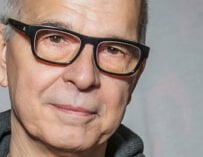
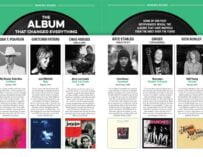

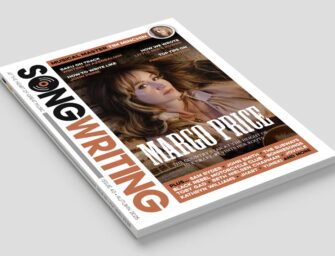
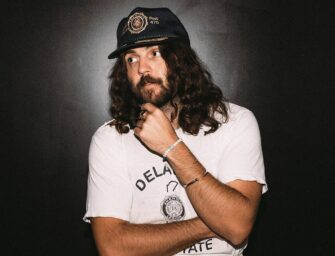
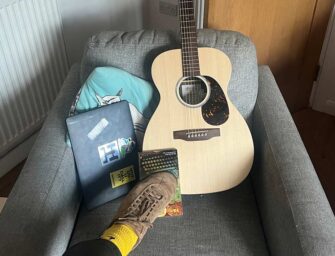
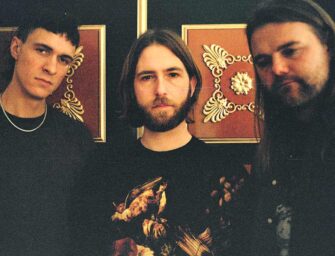





















Related Articles